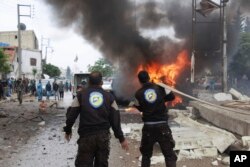Russia-sponsored Syrian cease-fire talks taking place Wednesday and Thursday in Astana, Kazakhstan will include a U.S. State Department envoy attending as an observer.
The move was confirmed Tuesday in a White House statement that followed talks between President Donald Trump and his Russian counterpart, Vladimir Putin.
Tuesday's call, described by the White House as "a very good one," is believed to be the first direct contact between the two leaders since U.S. warships targeted a Syrian military airbase -- used by both Syrian forces and their Russian allies -- with dozens of cruise missiles on April 4.
Trump directly linked the U.S. missile strike, which triggered an angry Kremlin response, to Syria's use of chemical weaponry in an attack that killed nearly 100 civilians days earlier.
Tuesday's White House statement said the two leaders also discussed the development of safe zones "to achieve lasting peace for humanitarian and many other reasons."
Under the previous administration of President Barack Obama, the U.S. was cool to the idea of setting up a safe zone, pointing to the complexity and manpower involved in protecting such an area.
But proponents say a safe zone inside of Syria would lessen the burden on other countries in the region that currently host more than 5 million refugees.
Deadly attacks
As the Astana talks began, a large explosion in northern Syria killed at least five people and wounded others.
The Britain-based Syrian Observatory for Human Rights said the blast in the rebel-held town of Azaz came from a car bomb.
Azaz has long been an important area for rebels who oppose President Bashar al-Assad, serving as a key supply route as well as a hub for fighters and opposition activists.
Several previous attacks in Azaz have been claimed by the Islamic State group, but there was no immediate claim for Wednesday's attack.
On Tuesday, the Observatory reported a surprise attack by Islamic State militants on a United Nations-funded refugee camp near the Syria-Iraq border that killed at least 32 civilians and wounded at least 20 others.
Kurdish and Syrian sources said many of the victims were holed up in the makeshift camp after fleeing fighting in areas of Syria and Iraq controlled by extremist forces.
The Observatory also reported heavy fighting between Kurdish fighters and extremists in the aftermath of the attack, and later said the U.S.-backed Kurdish and Syrian Arab Syrian Defense Forces (SDF) had regained control of the area in al-Hasakah province.
SDF force advances in Tabqa
Separately Tuesday in the nearby Euphrates River city of Tabqa, monitors reported the deaths of more than 35 Islamic State fighters battling the SDF in a last-ditch attempt to prevent anti-jihadist forces from gaining full control of the city.
SDF forces and their nominal Syrian Arab allies in northern Syria have been pushing eastward through the Euphrates River valley for months in a protracted offensive aimed at confronting Islamic State in its de facto capital, Raqqa.
The anti-jihadist forces are expected to launch coordinated attacks on the IS stronghold city later this year.
Aid convoy
Separately Tuesday near Damascus, the International Committee of the Red Cross said an aid convoy of food and medical supplies reached the besieged town of Douma for the first time since October.
An ICRC tweet late Tuesday said the convoy had entered the town northeast of Damascus under the cover of darkness, with 51 trucks carrying emergency supplies for 35,000 people.
Rebel-held Douma has been under government siege for nearly four years.






